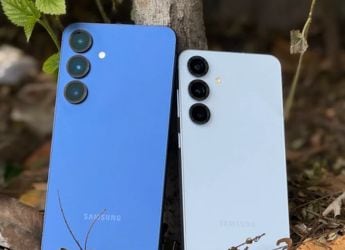- Home
- Mobiles
- Mobiles Features
- Ex Googler Turns Mom's Money Into a Billion Dollars
Ex-Googler Turns Mom's Money Into a Billion Dollars

Photo Credit: Bloomberg photo by Qilai Shen
After Steven Yang left his coveted job at Google, he asked his mother whether he should take venture-capital money to fund his business idea.
If his online consumer-electronics enterprise was a risky bet, she told him, go with the venture capitalists. But if building the business into something great was his destiny, he instead should use her money from a pharmaceutical career in China.
So Yang combined his Google money with his mom's, and with less than $1 million (roughly Rs. 6.7 crores) in seed capital he moved from California to Shenzhen, a hub in southern China for technology companies. Seven years later, Anker Innovations Technology Co. sells products ranging from smartphone chargers to portable power banks on Amazon.com. And it's getting even bigger after recently reaching a deal to put products in almost 4,000 Walmart and 900 Best Buy stores in the US.
Recent trades on China's over-the-counter New Third Board market valued Anker at about $1.1 billion (roughly Rs. 7,400 crores). Yang, 36, and his wife have a combined stake of about 54 percent, according to a Bloomberg analysis of the company's first-quarter report for 2018.
Anker offers chargers that are alternatives to those from companies like Samsung Electronics or Apple and come with proprietary PowerIQ technology, which detects each phone's maximum wattage to help minimise charging times. Yang also has branched out into just about every other smartphone-related gadget, including cables, headphones and wireless charging pads. And he's making household products like robotic vacuums under the Eufy brand.
"We really put a lot of love, and hate, into our products," Yang said, referencing the year-long tedium of shrinking the vacuum robot down to 2.85 inches in height so it could fit under couches.
As smartphone maker Xiaomi Corp. prepares for a Hong Kong initial public offering, Yang figures the timing may be right for him, too. He's studying the possibility of going public in China, Japan, Hong Kong or the US.
If he decides to proceed, he could have his work cut out for him. As of early May, two-thirds of the 21 China tech IPOs in the past year were below their issue price. Xiaomi had been targeting an eye-popping $100 billion (roughly Rs. 6.7 lakh crores) valuation for its debut, but now is eyeing $60 billion to $70 billion, people familiar with the matter told Bloomberg earlier this month.
Yang has taken on several funding rounds over the years, and investors are coming knocking again. Jumei International Holding, a US.-listed Chinese beauty e-commerce firm, bought a 60 percent stake in Anker's powerbank-rental unit last year for CNY 300 million ($47 million).
Anker's revenue surged 56 percent in 2017 to CNY 3.9 billion (roughly Rs. 4,100 crores), and profit grew 9.9 percent to CNY 356 million (roughly Rs. 375 crores), according to its annual report. It has offices in Seattle, Dubai, Tokyo, Shenzhen and Changsha, China, according to its website. Almost half of its revenue comes from the US., but China sales doubled last year.
Like many China tech companies, Anker is also following President Xi Jinping's goal of making the nation a leader in developing artificial intelligence, and it has a lab for developing facial recognition for security purposes.
Its expansion has come as Yang seized opportunities created by gaps in the technology industry. In the smartphone business, he targeted the opening between Apple's expensive chargers and low-quality, white-label replacements.
Anker occupies the space between five-star and three-star Amazon reviews (most Anker products have about four). That is Yang's sweet spot, where he creates an accessory that isn't the most expensive but still is of good-enough quality to win consumer trust.
That also means his brands must contend with fierce competition online.
"Selling via Amazon is absolutely still a viable strategy for smaller brands," said Benjamin Cavender, analyst at China Market Research Group. "However, Amazon is increasingly selling its own brand products via its marketplace, which means that smaller companies need to be very aggressive about providing good products and service at attractive price points."
These days Yang is also hoping tensions around a trade war between China and the US. don't escalate. Nearby is the Shenzhen campus of telecommunications giant ZTE Corp., which had to shut major operations after a Trump administration ban on its ability to buy US technology. Trump earlier this month tweeted that he was working on a way to get ZTE back into business.
One of Anker's great advantages is that it's embedded with the supply chain in Shenzhen. The city was a fishing village just four decades ago, until Communist Party Chairman Deng Xiaoping turned it into the country's first Special Economic Zone as part of China's economic opening.
It blossomed into the world's electronics manufacturing hub, with the vast majority of consumer electronics produced there. It's now evolving again as entrepreneurs like Yang follow big names Tencent Holdings to Huawei Technologies Co. in setting up shop.
Yang recruits from a large talent pool in Shenzhen, and he's hired some fellow ex-Googlers: the former China sales head and two product developers.
Each of the company's offerings is designed by fiefdom-like teams that sometimes crowdfund their early-stage prototypes. At the Shenzhen office, they're seen scribbling notes onto transparent conference walls.
Yang grew up in central China's Changsha and studied computer science at Peking University and then at the University of Texas at Austin.
He developed his programming skills in five years at Google. Two years before leaving the company, he built an automated system for his girlfriend (now his wife), who was selling women's accessories and other products on Amazon as a side business. The system fixed inventory, logistics, fulfillment and tracking of sales, and it began fulfilling 300 orders a day.
But he had to learn hardware from scratch when he started Anker. Mobile-phone batteries haven't changed all that much since before smartphones. Dying batteries remain a bane of the digital age, and researchers are already looking for solutions.
So, although Anker's chargers are a best-seller, Yang is already preparing for the day they will be obsolete, pushing products like Anker's $14.99 (roughly Rs. 1,000) wireless charging pads.
He learned the importance of constantly looking ahead from his mother, who gave up a job at a state-owned company to set up her own pharma business.
"She said: If you think this business is going to be something, then take my own money," Yang said. Now, to keep the business growing, Yang will have to stay relevant in a fiercely competitive global market.
© 2018 Bloomberg LP
Catch the latest from the Consumer Electronics Show on Gadgets 360, at our CES 2026 hub.
Related Stories
- Samsung Galaxy Unpacked 2025
- ChatGPT
- Redmi Note 14 Pro+
- iPhone 16
- Apple Vision Pro
- Oneplus 12
- OnePlus Nord CE 3 Lite 5G
- iPhone 13
- Xiaomi 14 Pro
- Oppo Find N3
- Tecno Spark Go (2023)
- Realme V30
- Best Phones Under 25000
- Samsung Galaxy S24 Series
- Cryptocurrency
- iQoo 12
- Samsung Galaxy S24 Ultra
- Giottus
- Samsung Galaxy Z Flip 5
- Apple 'Scary Fast'
- Housefull 5
- GoPro Hero 12 Black Review
- Invincible Season 2
- JioGlass
- HD Ready TV
- Laptop Under 50000
- Smartwatch Under 10000
- Latest Mobile Phones
- Compare Phones
- OPPO Reno 15 FS
- Red Magic 11 Air
- Honor Magic 8 RSR Porsche Design
- Honor Magic 8 Pro Air
- Infinix Note Edge
- Lava Blaze Duo 3
- Tecno Spark Go 3
- iQOO Z11 Turbo
- Lenovo Yoga Slim 7x (2025)
- Lenovo Yoga Slim 7a
- Lenovo Idea Tab Plus
- Realme Pad 3
- Moto Watch
- Garmin Quatix 8 Pro
- Haier H5E Series
- Acerpure Nitro Z Series 100-inch QLED TV
- Asus ROG Ally
- Nintendo Switch Lite
- Haier 1.6 Ton 5 Star Inverter Split AC (HSU19G-MZAID5BN-INV)
- Haier 1.6 Ton 5 Star Inverter Split AC (HSU19G-MZAIM5BN-INV)







![[Sponsored] Haier C90 OLED TV | Dolby Vision IQ, 144Hz OLED and Google TV in Action](https://www.gadgets360.com/static/mobile/images/spacer.png)









